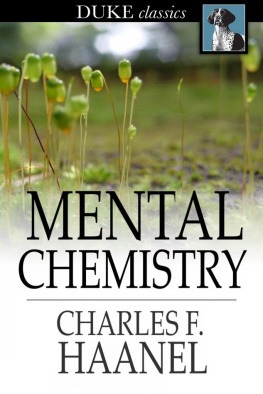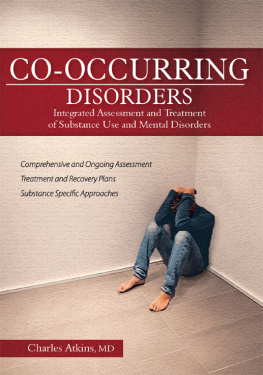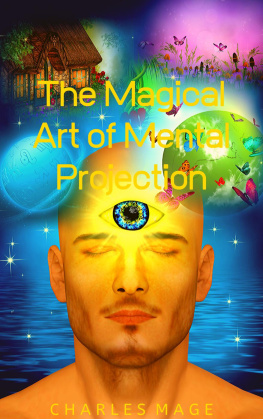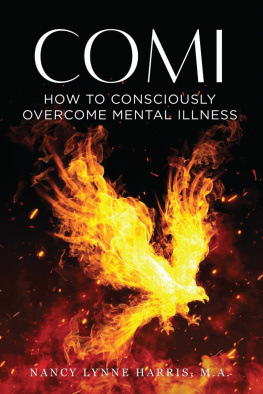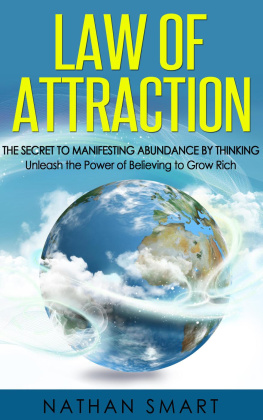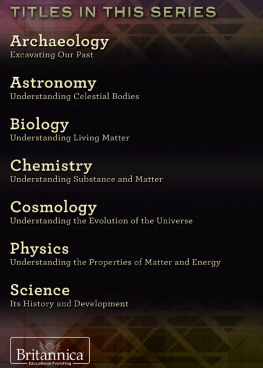| Mental Chemistry |
| Charles F. Haanel |
| Duke Classics (Aug 2012) |
|
| Tags: | Mind, Well Being, New Thought |
| Mindttt Well Beingttt New Thoughtttt |
For every problem, there is a solution.
For every person, there is a meaning.
For every success, there is a formula.
Synopsis
We live in a fathomless sea of plastic mind substance. This substance is ever alive and active. It is sensitive to the highest degree. It takes form according to the mental demand. Thought forms the mold or matrix from which the substance expresses. Our ideal is the mold from which our future will emerge.
Charles F. Haanel penned those words and in Mental Chemistry you will discover exactly how you and your thoughts and perceptions shape the world around you and how you can use your mental faculties to control what happens in your life. Some of the secrets you will learn are
- How to suggest sickness and pain from your life.
- A sure-fire plan to quit smoking forever.
- How you can influence luck, fate, chance, and destiny.
- What it means to be one of the 2% that shapes progress and how you can be a part of that.
- Why you are the way you are and methods to change if you so desire.
In the tradition of his best-selling book The Master Key System, Mr. Haanel delivers to us more insight into life and the ways and means to live it to the fullest. Originally published in 1922, Mental Chemistry continues to be pertinent and poignant today. With his unique way of making the complex understandable and the arcane graspable, Mr. Haanel supplies you with the knowledge you need for your continuing success and attainment.
About the Author
Charles Francis Haanel was a noted American New Thought author, philosopher and a businessman.
He is best known for his contributions to the New Thought Movement through his book The Master Key System.
MENTAL CHEMISTRY
* * *
CHARLES F. HAANEL
Mental Chemistry
First published in 1922
ISBN 978-1-62011-719-4
Duke Classics
2012 Duke Classics and its licensors. All rights reserved.
While every effort has been used to ensure the accuracy and reliability of the information contained in this edition, Duke Classics does not assume liability or responsibility for any errors or omissions in this book. Duke Classics does not accept responsibility for loss suffered as a result of reliance upon the accuracy or currency of information contained in this book.
Contents
1. Mental Chemistry
Chemistry is the science which treats of the intra-atomic or the intra-molecular changes which material things undergo under various influences.
Mental is defined as of or appertaining to the mind, including intellect, feeling, and will, or the entire rational nature.
Science is knowledge gained and verified by exact observation and correct thinking.
Mental chemistry is, therefore, the science which treats of the changes which material conditions undergo through the operations of the mind, verified by exact observation and correct thinking.
As the transformations which are brought about in applied chemistry are the result of the orderly combination of materials, it follows that mental chemistry brings about results in a like manner.
Any conceivable number may be formed with the Arabic numbers 1, 2, 3, 4, 5, 6, 7, 8, 9, 0.
Any conceivable thought may be expressed with the 26 letters of the alphabet.
Any conceivable thing can be organized with the 14 elements and always and only by the proper grouping of electrons into molecules.
When two or more molecules are grouped a new individuality is created, and this individuality which has been called into being possesses characteristics which are not possessed by either of the elements which gave it being.
Thus one atom of sodium and one of chlorine give us salt, and this combination alone can give us salt, and no other combination of elements can give us salt, and salt is something very different from either of the elements of which it is composed.
What is true in the inorganic world is likewise true in the organiccertain conscious processes will produce certain effects, and the result will invariably be the same. The same thought will always be followed by the same consequence, and no other thought will serve the purpose.
This must necessarily be true because the principle must exist independently of the organs through which they function. Light must existotherwise there could be no eye. Sound must existotherwise there could be no ear. Mind must existotherwise there could be no brain.
Mental action is therefore the interaction of the individual upon the Universal Mind, and as the Universal Mind is the intelligence which pervades all space and animates all living things, this mental action and reaction is the law of causation.
It is the Universal Chemist, but the principle of causation does not obtain in the individual mind but in the Universal Mind. It is not an objective faculty but a subjective process.
The individual may, however, bring the power into manifestation and as the possible combinations of thought are infinite, the results are seen in an infinite variety of conditions and experiences.
Primordial man, naked and bestial, squatting in gloomy caverns, gnawing bones, was born, lived, and died in a hostile world. His hostility and his wretchedness arose from his ignorance. His handmaidens were Hate and Fear. His sole reliance was his club. He saw in the beasts, forests, torrents, seas, clouds, and even in his fellow man, only enemies. He recognized no ties binding them one to another or to himself.
Modern man is born to comparative luxury. Love rocks his cradle and shields his youth. When he goes forth to struggle he wields a pencil, not a club. He relies upon his brain, now his brawn. He knows the physical as neither master nor equal, but as a useful servant. His fellow men and the forces of Nature are his friendsnot his enemies.
These tremendous changes, from hate to love, from fear to confidence, from material strife to mental control, have been wrought by the slow dawn of Understanding. In direct proportion as he understands Cosmic Law is mans lot enviable or the reverse.
Thought builds organic structures in animals and men. The protoplasmic cell desires the light and sends forth its impulse; this impulse gradually builds an eye. A species of deer feed in a country where the leaves grow on high branches, and the constant reaching for their favorite food builds cell by cell the neck of the giraffe. The amphibian reptiles desire to fly in the open air above the water; they develop wings and become birds.
Experiments with parasites found on plants indicate that even the lowest order of life makes use of mental chemistry. Jacques Loeb, M. D., Ph. D., a member of the Rockefeller Institute made the following experiment: In order to obtain the material, potted rose bushes are brought into a room and placed in front of a closed window. If the plants are allowed to dry out, the aphides (parasites), previously wingless, change to winged insects. After the metamorphosis, the insects leave the plants, fly to the window and then creep upward on the glass.
It is evident that these tiny insects found that the plants on which they had been thriving were dead, and that they could therefore secure nothing more to eat and drink from this source. The only method by which they could save themselves from starvation was to grow temporary wings and fly, which they did.

